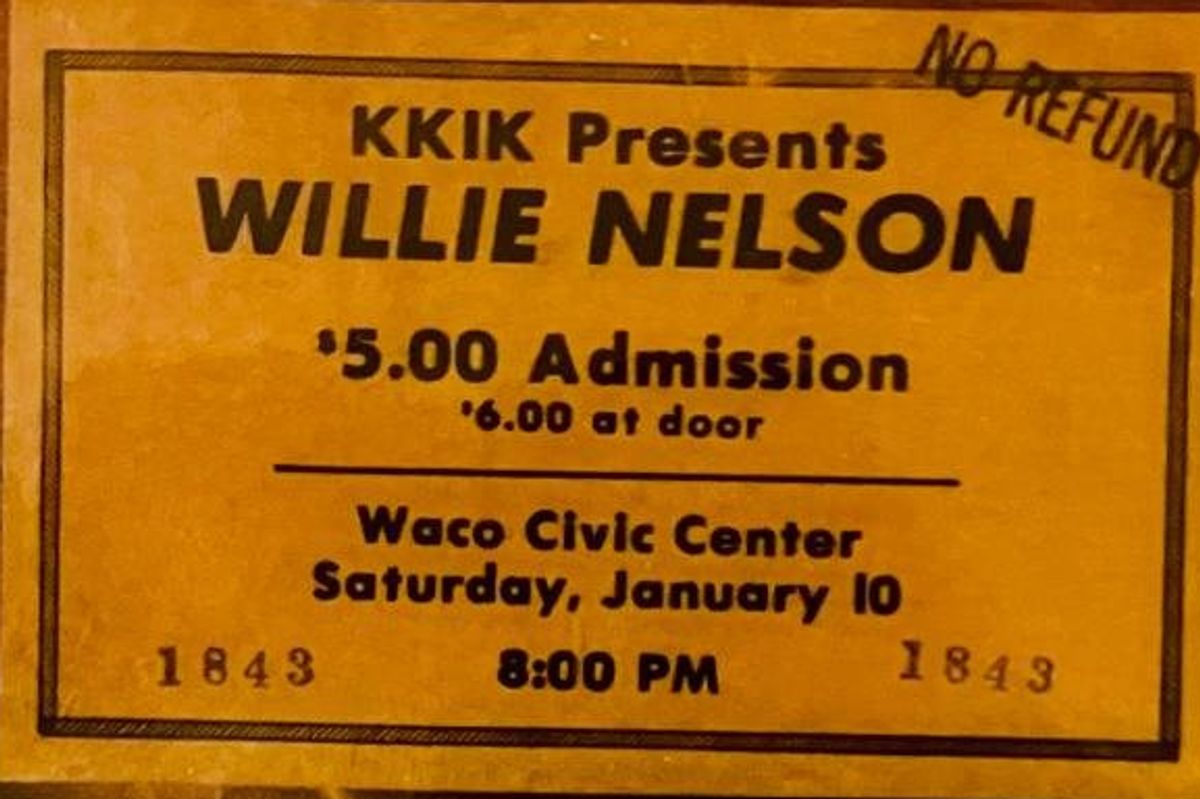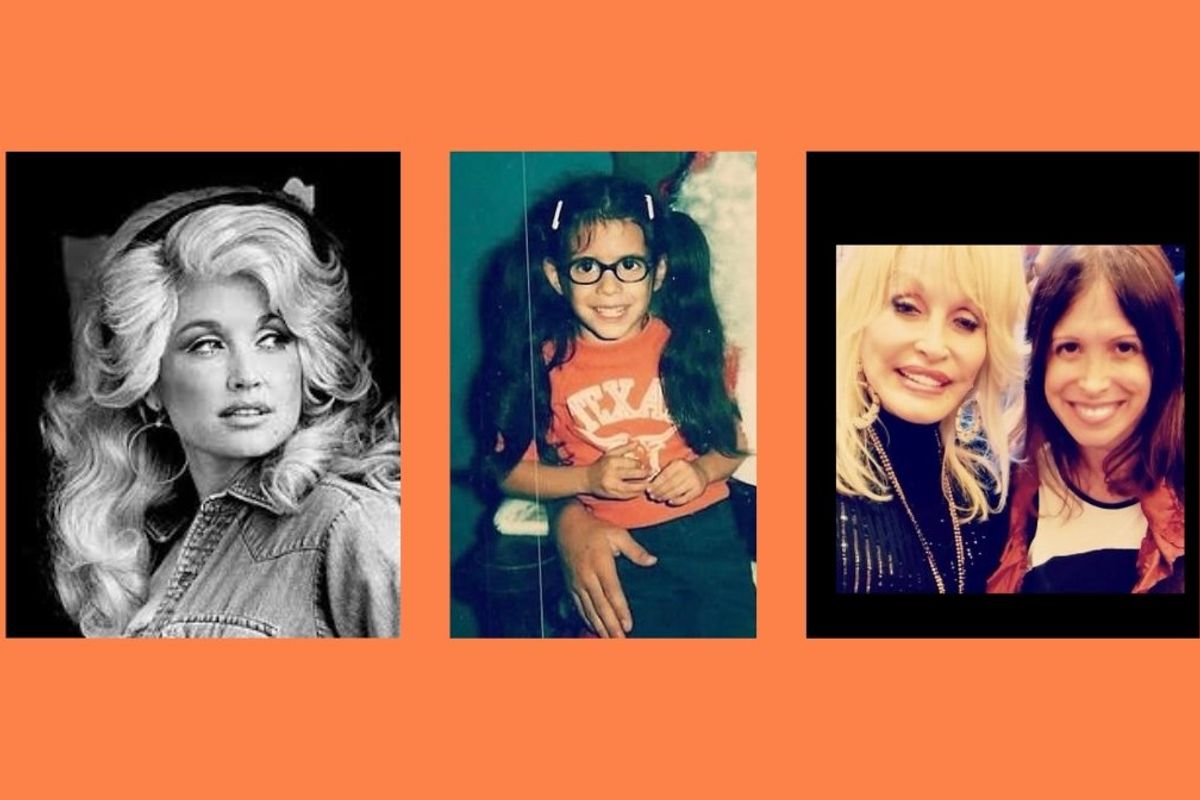I had the sweetest moment with Dolly Parton when I was 6 years old. 40 years later, it happened again.
Hello, Dolly!
Dolly Parton and Cecily Knobler
Sometimes, serendipity strikes like a tiny and beautiful lightning bolt.
Dolly Parton has been magnetic since she could walk. Already a proficient songwriter, she was singing on Tennessee radio shows as a child and even performed at the Grand Ole Opry at just 13. In 1967, she joined The Porter Wagoner Show, becoming a popular country duo with Wagoner himself.
After a few hits on her own, she was ready to spread her wings into a solo career. So, in hopes of giving it a little boost, she joined country legend Willie Nelson's tour in January of 1977. One of those shows was in Waco, Texas.

In that exact month, in that exact year, I was a precocious six-year-old with pigtails and thick Coke-bottle glasses, also living in Waco, Texas. My dad was the General Manager of an AM country station called K-K-I-K (K-Kick) at the time, and quite frequently, country stars would stop by to promote their new records, sign albums and headshots, and just overall meet the radio crew.
When Dolly came to the tiny station (which incidentally sat above the ballet studio where my mother taught and I danced), I happened to be there—probably in a leotard. My dad introduced us, and my heart thumped like a jackrabbit. I was already a fan, with "I Will Always Love You" (Dolly's original version, obviously) playing on repeat on a scratched-up 45.
I had never met anyone famous before, and Dolly—even then—glowed like a firecracker sizzling against a Texas sky. "Say hello, Cecily," my dad urged. "Hello, Dolly!" Her reply was as big as her hair: "You're just a little baby! Aren't you the cutest baby?" She hugged me like our lives depended on it, and I remember simply floating home. Even then, so young, I knew I had met not only a legend, but a really, really kind one.
The tour itself wasn't entirely successful for her. We went to the show at the Waco Convention Center, and unfortunately, the Willie and Dolly fans didn’t quite gel. I didn't pick up on it at the time, though; I was personally over the moon that she opened her set with "Jolene." But I do remember my parents discussing how scared she looked by the less-than-accepting crowd. (Over time, music journalists would write about it, but thankfully—Dolly and Willie remain friends.)

Almost exactly 42 years later, luck would strike again. In December of 2018, I was invited to a party at the Four Seasons Hotel to honor the 2018 film Dumplin’. Dolly just so happened to have written six original songs for the soundtrack, and Netflix was drumming up support for the upcoming "award season."
There were rumors she’d be there, but with busy schedules, one can never be totally sure. As I was drinking a glass of champagne and eating my fourth tuna tartare bite, there was suddenly a palpable buzz in the day-lit room. The cute out-of-work actors turned tray passers parted like it was the Red Sea. If this had been a movie, a golden light would have struck from the heavens as angels sang, "Hallelujah" because just like that—Dolly appeared.
The gravity around a star this bright causes whatever room they enter to fold in on itself. Dolly was no exception! People abandoned their drinks and boring conversations and zoomed quickly in her direction. It actually got a little dangerous, as there were many elderly women on rhinestone-encrusted scooters zipping furiously to get their moment in the sun.

Luckily, I can outrun a rhinestone-encrusted scooter. I pushed my way through (gently, of course), elbowed a couple of publicists, and found myself once again, face-to-face with Ms. Parton. Remembering my dad’s prompting, I enthusiastically said, "Hello, Dolly!" This time I added, "You couldn’t possibly remember this. But I met you at a country station in Waco back in the late ’70s. You told me I was the ‘cutest baby!’"
Almost as if she were living her lyrics from "Here You Come Again." she smiled that smile. Her bluish-green eyes glistened as she patted me on the arm. "Well I do remember! And you're still the cutest baby!"
- Dolly Parton sings "Here You Come Again" www.youtube.com, Dolly Parton YouTube page, Vevo
That’s just like Dolly— o make me feel like a million bucks in first grade and then again in my 40s. We had time for a quick photo snap before she was whisked away by a male Dolly impersonator wearing a white pantsuit.
That serendipitous lightning bolt sure did strike again. Only this time, it had rhinestones on it.

